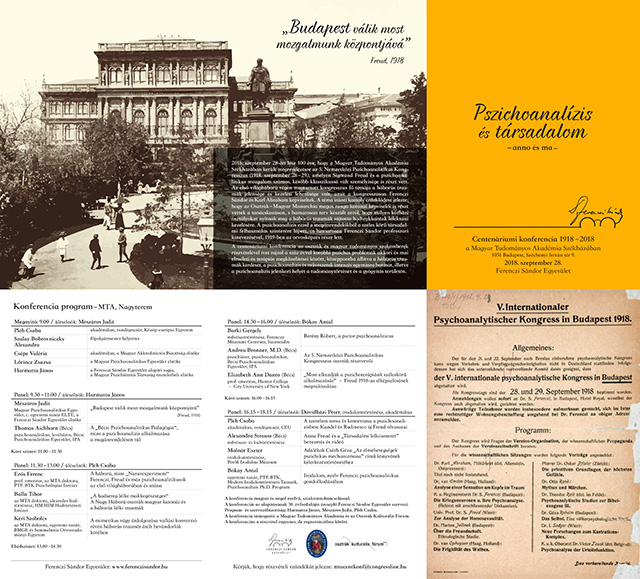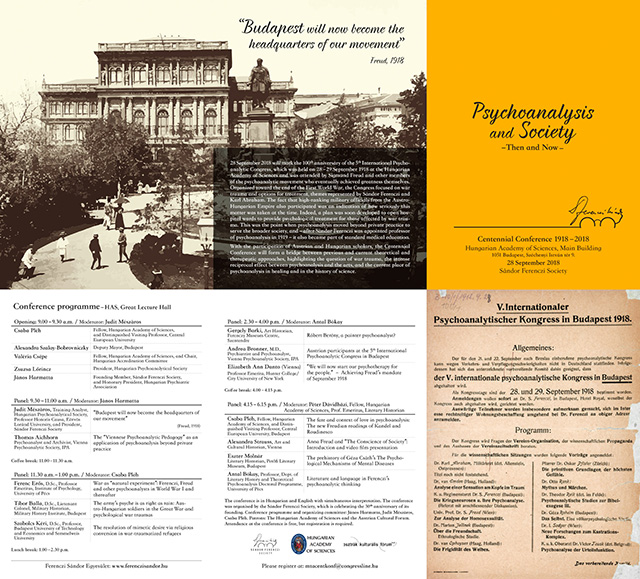

Dear Visitor! Our English website is under construction.


Nemzetközi konferencia Ferenczi Sándor születésének és Buda, Pest és Óbuda egyesítésének 150. évfordulója alkalmából
A konferencia nyelve angol. Részletes információk az alábbi linkekre kattintva találhatóak:
Save the Date! Ferenczi 150 Budapest Anniversary International Conference
First Announcement – Ferenczi 150 Budapest Anniversary International Conference
Opening speech
Ferenczi150Budapest Anniversary Conference
Budapest, June 9, 2023 – Central European University
By Judit Mészáros
Ladies and Gentlemen, dear Colleagues and Friends,
I am greatly honoured and pleased to be able to welcome you all to the Ferenczi150Budapest conference to celebrate Ferenczi’s birthday in the city where he lived and worked as a physician and a psychoanalyst.
At this special event, we are delighted and honoured to welcome Howard Levine, the chair of this opening plenary and member of the American Psychoanalytic Association, the PINE Psychoanalytic Center and the Contemporary Freudian Society. I also welcome with pleasure Anett Felházi, Secretary of the Hungarian Psychoanalytical Society; Csongor Juhos, President of the Free Association Lisbon; and Csaba Pléh, Fellow of the Hungarian Academy of Sciences and visiting professor at the Central European University.
When Ferenczi met Freud at the age of 35, he was already a physician with considerable experience in psychology as well as an expert in forensic medicine with more than a hundred publications to his name. Their meeting had a profound impact on both their personal lives and the international psychoanalytic movement. Here in Budapest, Ferenczi engaged with the forums available to reach beyond the medical community to the avant-garde intelligentsia and to speak to writers, artists, medical students and social scientists about his new human perspective on psychoanalysis. Psychoanalysis became integrated into the cultural life of the city with incredible speed. Ferenczi’s clinical observations, his theoretical approaches and the professional community that grew around him, the Budapest School, have all played a decisive role in modern psychoanalysis and continue to influence our thinking today.
Half a century later, after his unexpected death in 1933 the Ferenczi Renaissance generation made Ferenczi’s unpublished works available and his legacy was rediscovered. Ferenczi’s theoretical and therapeutic initiatives have been incorporated into contemporary psychoanalysis.
Founded 35 years ago, in 1988, the Sándor Ferenczi Society has been a strong link in this process. The Society was founded a mid the socio-political changes taking place in Central Eastern Europe and entered the international arena, where colleagues with common interests in scholarship and psychotherapy could come together.
Held in Budapest exactly 30 years ago, in 1993, the Talking Therapy: Ferenczi and the Psychoanalytic Vocation conference launched a series of international Ferenczi conferences. Following each other in rapid succession, these spontaneous international gatherings have presented a wealth of research and clinical experience, thus providing inspiration for further in-depth work. These events have brought together like-minded individuals and groups from distant continents and created a platform for discussion from Europe to North and South America to Asia and Australia.
Here is just a taste of the international conferences that have been mounted as part of the Ferenczi network – with four out of these 15 conferences having been held right here in Budapest.
Local Ferenczi conferences with international participations have also been held around the world, the first among them being in New York (in 1991). Others have been organised in Vancouver (in 2011), Dublin (in 2019), Paris, London and Lisbon (in 2020), and Sao Paulo (1995), to name but a few.
Ferenczi’s once unpublished work has now seen the light of day in the major languages of the world. The first 3 volumes of the most complete edition of his oeuvre is now available in Hungarian – as the Ferenczi Society and the Oriold Publishing House birthday present – the full series will come out in this year. Ferenczi’s reception has taken concrete form in hundreds of books, studies, doctoral theses, exhibitions and films. We have likewise seen the publication of Ferenczi-Groddeck, Ferenczi–Jones and first of all Freud–Ferenczi correspondence, whose significance in the history of scholarship transcends psychoanalysis. Among these achievements is the international cooperative effort together with the Mary Sigourney award granted to the Sándor Ferenczi Society in 2008, that made it possible to purchase Ferenczi’s former office in what had been his villa in the leafy Naphegy section of Budapest. The Ferenczi House, as it has come to be known, and its Archives play an active role in preserving Ferenczi’s and the Budapest School’s intellectual heritage.
On behalf of all of us, I wish to thank the Central European University Budapest, an institution that represents democracy and self-reflective critical thinking, for hosting this scholarly meeting celebration of Ferenczi’s 150th birthday within its walls, which, for political reasons, have now become historic. As a psychoanalyst and outstanding thinker, Ferenczi stood for interdisciplinary openness, sensitivity to social and societal processes, and, above all, respect for human dignity.
This conference gathers clinicians, scholars and historians in the field of psychology. Today, we all face enormous social, economic and ecological challenges. This conference will also engage in a dialogue on how psychoanalysis can contribute to changes that can make our world more human and our lives more joyful.
To this end, I wish you – indeed, all of us – fruitful discussions in a constructive atmosphere and memorable personal encounters.